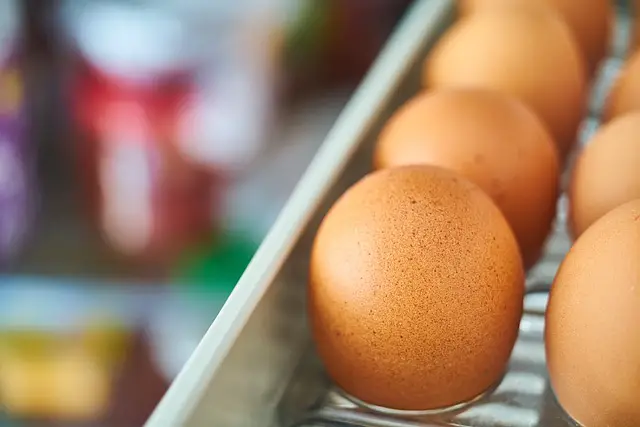[ad_1]
Estimated reading time: 10 minutes
You use them in all kinds of recipes, from cakes to salads and from side dishes to main courses. Chicken eggs are a mainstay of the American diet. However, a deadly outbreak of avian flu in 2022 upended egg production and sent prices soaring to record highs last winter.
In February 2023, Americans paid an average of $4.21 for a dozen Grade A large eggs, more than double the price of a year earlier. And even that price was down from the January 2023 average high of $4.82 a dozen.
Egg prices fell by nearly 11 percent in March, thanks to increased egg production and weaker consumer demand. Many families resorted to plastic eggs (and even dyed potatoes!) for their Easter egg hunts this year. And some folks have cut back on their egg consumption to save money. Still, others have looked to raising their own chickens or purchasing farm-fresh eggs instead of supermarket eggs.
Whatever you’ve been doing to get through this period of “eggflation,” you’re sure to want to make the most of your investment.Before we get into our list of ways to preserve eggs, however, it’s essential to point out the difference in shelf-life between store-bought eggs and fresh eggs.
Fresh whole eggs that have not been washed have a natural coating on their shells that provides a protective barrier from harmful bacteria. These eggs may be stored at room temperature, unwashed with pointy ends down for up to two weeks. Unwashed eggs can last five weeks or more in the refrigerator.
On the other hand, supermarket eggs have had their protective coatings washed away. Store-bought eggs in the shell must be stored in the refrigerator. According to the USDA, these eggs will last three to five weeks in the fridge.
If your hens have been laying more eggs than you can keep up with, or you caught a great deal on store-bought eggs, you may want ideas for extending the above storage times. Here is a list of 15 ways to preserve eggs.
1. Freezing eggs
Freezing eggs is an easy and reliable method. However, you cannot freeze eggs in their shells. Freezing would cause the shell to expand and crack. Therefore, you’ll want to freeze the inside contents of the egg, not the entire egg.

One method is to pour scrambled eggs into the sections of a silicone ice cube tray or a muffin tin. Cover the tray with plastic wrap and place the tray in the freezer for at least 24 hours. For long-term storage, you can pop out the frozen cubes and place them inside a freezer bag.

When you are ready to use a frozen cube, allow it to thaw first in an airtight container in the refrigerator. Here’s more on how to freeze eggs.
2. Dehydrating eggs

Another way to preserve eggs is by making an egg powder through dehydration. You can use egg powder in baked goods, as well as scrambled eggs and omelets.
It’s okay to use your oven or a dehydrator to dehydrate raw or cooked eggs. However, dehydrating cooked scrambled eggs is faster and offers less of a threat of bacteria.
Here is a video that demonstrates both the dehydrating and rehydrating process in the home kitchen.
3. Boiling eggs

Let’s not forget an easy one — hard-boiling eggs. You can extend the life of raw eggs by at least a week by boiling them in water and then storing them in the fridge.
In case you need a quick refresher course, here’s how to hard-boil eggs.
4. Pickling eggs

To extend the life of those hard-boiled eggs further, you can pickle them. This method, which was common before homes had refrigerators, has several different approaches. Here are pickling instructions from the National Center for Home Food Preservation, and here are four recipes for pickling eggs.
For best results, allow eggs to pickle for five to seven days. Once they are sealed in an airtight jar, pickled eggs will last for three to four months in the refrigerator.
5. Water glassing eggs

Instructions for this traditional method of preserving eggs were found in the 1896 Fannie Farmer Boston Cooking-School Cookbook. This cookbook was the first one to provide easy-to-follow directions and level measurements.
Water glassing involves storing fresh eggs in a jar filled with a sodium silicate solution. Eggs can last up to 18 months with this method. Here are the written instructions.
6. Using lime water to preserve eggs

Pickling lime (also called slaked lime or hydrated lime) is another solution you can use to preserve eggs. Check out this video that demonstrates this method with unwashed fresh eggs. And here’s another one.
7. Freeze drying eggs

Freeze drying eggs is similar to dehydrating in that both create an egg powder. However, freeze-dried egg powder is typically finer than dehydrated powder.
You can easily rehydrate freeze-dried eggs for use in your baked goods. About two tablespoons of the freeze-dried powder equal one egg.
Here’s how to freeze-dry eggs for long-term storage.
8. Curing eggs in salt

You can preserve egg yolks with a salting method that is common in parts of Asia. The first step is to separate the whites from the yolks. It’s essential to use sea salt rather than ordinary table salt for this method.
Check out this video for instructions and this recipe for salted preserved eggs. These preserved eggs can last up to a year when stored in a sealed container in the refrigerator.
9. Thermostabilizing eggs

This preservation method involves heating eggs just enough to kill any bacteria on the shell and slightly cooking the layer of egg whites just beneath the shell. It’s the process NASA used to send astronauts into space with easy-to-prepare eggs.
Learn about thermostabilizing eggs in this article.
10. Fermenting eggs

You can ferment eggs by hard-boiling, peeling, and placing them in brine. The resulting shelf life is about two to three weeks.
Check out this article for the steps you need to follow to ferment eggs.
11. Oiling eggs

Mineral oil can extend the shelf life of fresh eggs. First, you need to allow the fresh eggs to rest at room temperature and become fully dry before following these steps.
12. Preparing egg noodles

Do you have more eggs than you can use right now? Another way to preserve your precious eggs is by making homemade egg pasta. Here’s a video that shows you how. You can make this tasty pasta by hand, but a pasta roller will save you a lot of time and effort.
13. Wrapping eggs
Did you know you can extend the life of refrigerated eggs by wrapping them in plastic wrap? When you wrap each eggshell in plastic, you effectively add another layer of protection from moisture loss, odors, and bacteria. Wrapped eggs will store in the fridge well for up to two months.
14. Making lemon curd

If you love to bake, another way to preserve your eggs is by using them to make lemon curd. You can use lemon curd as a flavorful ingredient in cakes, muffins, crepes, and breads. This article offers an easy lemon curd recipe.
You can store homemade lemon curd in an airtight container in the refrigerator for about two weeks or freeze it for a month or longer.
15. Refrigerating eggs properly.

Most store-bought eggs will stay fresh for four to five weeks after their packing date. This date is shown in the three-digit Julian date printed on the end of the egg carton. For example, a Julian date of January 1 is 001, and a December 31 Julian date is 365. Most cartons also have a sell-by date.
It’s best to place store-bought eggs on the inside shelf of the refrigerator, not the refrigerator door. That’s because the temperature on an inside shelf is more consistent than the door. Also, keeping eggs in their carton helps protect them against food odors and helps prevent moisture loss.
For more information on egg preservation and egg safety, here are some resources.
[ad_2]
Source link
Get more stuff like this
in your inbox
Don't Be Left Unprepared
Thank you for subscribing.
Something went wrong.



